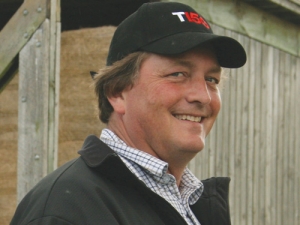Hill country farmers are daft if they put their heads in the sand and ignore the prospect of central and local government regulations having an impact on their farming operations.
That's the view of Federated Farmers vice president and hill country farmer Anders Crofoot, who spoke last week at the hill country symposium in Rotorua.
He says it's also important that farmers don't have a kneejerk reaction to regulations and that it's better to engage with local authorities at an early stage and have input, rather than have rules imposed on them.
"The purpose of my paper was to document that there are impacts and to encourage farmers to get involved with the people making the decisions," Crofoot told Rural News. "If they don't, they are leaving a critical part of their business to somebody else."
Crofoot says historically government policy has had a huge impact on hill country farming. He says things such as supplementary minimum prices, land development and encouragement loans (LDLs) all had impacts. Some were positive, but LDLs – to fund the clearing of land – had a negative impact and new policies are being devised to deal with erosion prone land. He believes such schemes had limited value.
Crofoot says the issue now is that the way such initiatives as the National Policy Statement (NPS) are being implemented must be on farmers' radars. He adds that regional councils are managing the implementation of the NPS in very different ways.
"Otago Regional Council is adopting an effects-based approach which is saying to farmers, in respect of stock exclusion, 'you are not to damage the banks of rivers and how you [prevent] that is up you'," Crofoot explains. "On the other hand, Hawkes Bay Regional Council, in the Tukituki Plan Change 6, is saying all stock except sheep must be excluded from waterways."
The more prescriptive approach by HBRC leaves farmers in no doubt what they must do. But Crofoot says the effects-based system, while providing flexibility, causes farmers uncertainty about whether or not they have complied with the rules.
Given that much decision making is at a regional level, Crofoot is urging farmers to lobby local MPs and local body leaders to ensure a practical and sensible outcome. At a national level there is only so much Federated Farmers can do, so effort at a local level is important.
"Everyone is learning the collaborative approach; some are doing it moderately well and others atrociously. These issues are resource hungry, especially in terms of people's time. In my view, you are either going to spend time or money, and for farmers both are scarce."



















